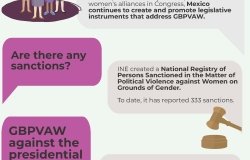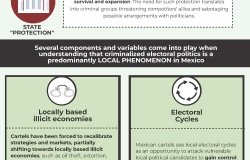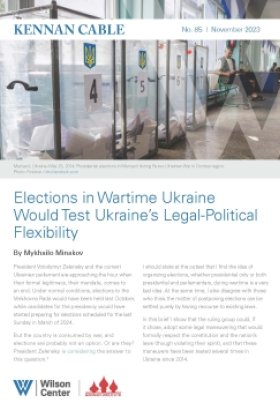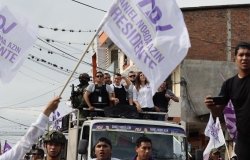U.S. Intelligence: Arab Spring Generated Threats
The Arab uprisings have “generated a spike in threats to U.S. interests… that will likely endure until political upheaval stabilizes and security forces regain their capabilities,” according to the U.S. intelligence community’s new worldwide threat assessment. Director of National Intelligence James Clapper delivered the report to the Senate on March 12.
The Arab uprisings have “generated a spike in threats to U.S. interests… that will likely endure until political upheaval stabilizes and security forces regain their capabilities,” according to the U.S. intelligence community’s new worldwide threat assessment. Director of National Intelligence James Clapper delivered the report to the Senate on March 12.
The report argued that three issues will affect U.S. interests in the Middle East. First, ungoverned spaces in Libya, Syria and Yemen could be used by extremist groups to prepare attacks on new governments or Western interests. Second, the inability of governments to meet expectations for economic improvement could destabilize vulnerable countries like Jordan. Third, negative views of the United States “could hamper counterterrorism efforts and other initiatives to engage transition governments.” The following are excerpts from the report, with a link to the full text at the end.
Arab Spring
Although some countries have made progress towards democratic rule, most are experiencing uncertainty, violence, and political backsliding. The toppling of leaders and weakening of regimes have also unleashed destabilizing ethnic and sectarian rivalries. Islamist actors have been the chief electoral beneficiaries of the political openings, and Islamist parties in Egypt, Tunisia and Morocco will likely solidify their influence in the coming year. The success of transitioning states will depend, in part, on their ability to integrate these actors into national politics and to integrate—or marginalize—political, military, tribal, and business groups that were part of or benefitted from the old regimes. At the same time, transitions that fail to address public demands for change are likely to revive unrest and heighten the appeal of authoritarian or extremist solutions.
Three issues, in particular, will affect US interests:
• Ungoverned Spaces. The struggles of new governments in places like Tripoli and Sanaa to extend their writs, as well as the worsening internal conflict in Syria, have created opportunities for extremist groups to find ungoverned space from which to destabilize the new governments and prepare attacks against Western interests inside those countries.
• Economic Hardships. Many states face economic distress—specifically, high rates of unemployment—that is unlikely to be alleviated by current levels of Western aid and will require assistance from wealthy Arab countries as well as reforms and pro-growth policies. Failure to meet heightened popular expectations for economic improvement could set back transitions in places such as Egypt and destabilize vulnerable regimes such as Jordan. Gulf states provide assistance only incrementally and are wary of new governments’ foreign policies and their ability to absorb funds.
• Negative Views of the United States. Some transitioning governments are more skeptical than their predecessors about cooperating with the United States and are concerned about protecting sovereignty and resisting foreign interference. This has the potential to hamper US counterterrorism efforts and other initiatives to engage transitioning governments.
Egypt
Since his election in June 2012, Egyptian President Muhammad Mursi has worked to consolidate control of the instruments of state power and loosen the Egyptian military’s grip on the government.Mursi has taken actions that have advanced his party’s agenda and his international reputation, including his late-2012 role brokering a HAMAS-Israeli cease-fire. However, his decree in November 2012 that temporarily increased his authorities at the expense of the judiciary angered large numbers of Egyptians—especially secular activists—and brought protesters back to the streets.
Quelling popular dissatisfaction and building popular support for his administration and policies are critical for Mursi and will have a direct bearing on the Freedom and Justice Party’s success in upcoming 15 parliamentary elections. A key element of Mursi’s ability to build support will be improving living standards and the economy; GDP growth fell to 1.5 percent in 2012 from just over 5 percent in 2010, and unemployment was roughly 12.6 percent in mid-2012.
Syria
Almost two years into the unrest in Syria, we assess that the erosion of the Syrian regime’s capabilities is accelerating. Although the Asad regime has prevented insurgents from seizing key cities— such as Damascus, Aleppo, and Homs—it has been unable to dislodge them from these areas. Insurgent forces also have been gaining strength in rural areas of northern and eastern Syria, particularly Idlib Province along the border with Turkey, where their progress could lead to a more permanent base for insurgent operations. Prolonged instability is also allowing al-Qa’ida’s Nusrah Front to establish a presence within Syria. (For details on Syria’s weapons and chemical and biological warfare programs, see the Proliferation section.)
• Sanctions and violence have stifled trade, commercial activity, and foreign investment, and reduced the regime’s financial resources—as many as 2.5 million people are internally displaced and roughly 700,000 have fled to neighboring countries since March 2011. The Syrian economy contracted by 10 to 15 percent in 2012, which has forced the regime to prioritize security spending and cut back on providing basic services, food and fuel, and health and education services for the public…
Iraq
Since the US departure, the Iraqi Government has remained generally stable, with the major parties pursuing change through the political process rather than violence. However, there are rising tensions between Prime Minister Maliki and Kurdistan Regional Government President Masud Barzani and an increase in anti-regime Sunni protests since the end of 2012. Maliki is pressing for greater authority over disputed territories in northern Iraq, and Barzani is pushing forward to export hydrocarbons independent of Baghdad. AQI conducted more vehicle and suicide bombings in 2012 than in 2011, almost exclusively against Iraqi targets. However, AQI and other insurgent groups almost certainly lack sufficient strength to overwhelm Iraqi Security Forces, which has put pressure on these groups through arrests of key individuals. Iraq is producing and exporting oil at the highest levels in two decades, bolstering finances for a government that derives 90 to 95 percent of its revenue from oil exports. Iraq increased production capacity from about 2.4 million barrels per day in 2010 to roughly 3.3 million barrels per day in 2012. However, it is still wrestling with the challenges of diversifying its economy and providing essential services.
Yemen
We judge that Yemen’s new president, Abd Rabuh Mansur Hadi, has diminished the power of former President Salih and his family and kept the political transition on track, but Salih’s lingering influence, AQAP’s presence, and the tenuous economy are significant challenges. Yemen’s humanitarian situation is dire, with nearly half of the population considered “food insecure.” Obtaining foreign aid and keeping its oil pipeline open will be crucial to Sanaa’s potential economic improvement. The next key political milestone will be the successful completion of an inclusive National Dialogue that keeps Yemen on course for elections in 2014, although some southern leaders are threatening non-participation. Hadi’s government will also have to maintain pressure on AQAP following a military offensive this past summer that displaced the group from its southern strongholds.
Lebanon
Lebanon’s stability will remain fragile during the next year primarily because of the tensions triggered by the Syrian conflict. We expect Lebanon will be able to avoid destabilizing sectarian violence, but it is 17 likely to experience occasional, localized clashes between pro- and anti-Asad sectarian militias. Thus far, political leaders have succeeded in muting popular outrage over the October 2012 bombing that killed a popular Sunni figure, and the Lebanese Armed Forces remain effective at controlling small-scale violence.
Libya
Libya’s leaders are struggling to rebuild after the revolution and the collapse of the Qadhafi regime. The institutional vacuum caused by Qadhafi’s removal increased terrorist activity and gave rise to hundreds of well-armed regional militias, many of which played key roles in overthrowing the regime but now complicate Libya’s stability. The transitional government is struggling to control the militias, but it remains reliant on some to provide security in the absence of cohesive and capable security institutions. Eastern Libya has been traditional hubs of extremists, and if left unchecked by Libyan authorities and allied militias, groups operating from there could pose a recurring threat to Western interests.
The government is also working to rebuild its administrative capacity as it manages the postrevolutionary transition and is overseeing the drafting of a constitution, which will set the stage for elections as soon as this year. Libya has quickly resumed high levels of oil production, which is critical to rebuilding the economy. As of late 2012, it restored crude oil output to near preconflict levels of 1.6 million barrels per day, but Tripoli will need the expertise and support of international oil companies to sustain, if not boost, overall supply.
Click here for the full report.
Related Program

The Islamists
Learn more about Hamas and how it relates to similarly aligned organizations throughout the region. Read more









